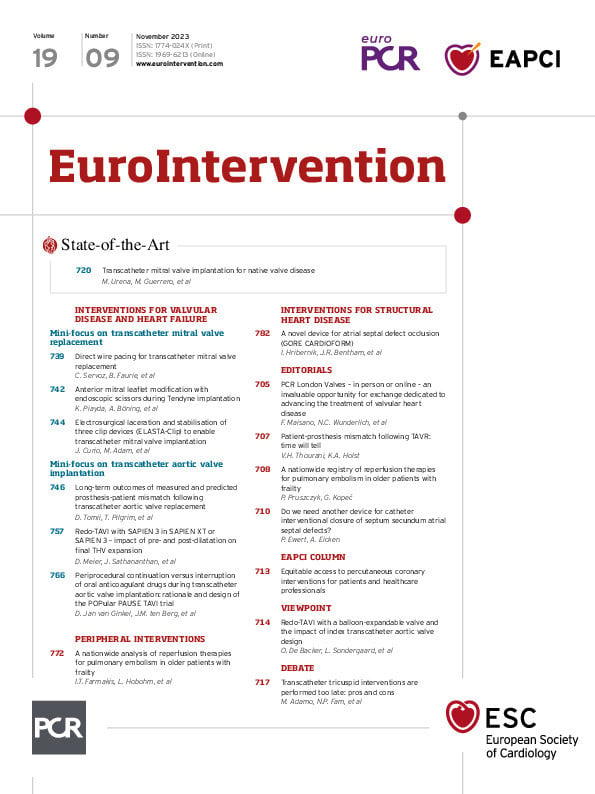Summary of the 2023 summit of the European Association of Percutaneous Coronary Interventions (EAPCI) – Nice, France, 22-23 June 2023
The aim of EAPCI summits is to bring together members of the EAPCI board and representatives of the National Societies and Interventional Working Groups associated with the EAPCI to discuss and develop strategies to advance education and practice in interventional cardiology. The theme of the 2022-2024 EAPCI Presidency is EAPCI 4.0 – Equitable Access to Percutaneous Cardiovascular Interventions 4 Patients and Professionals. Here we report the highlights of the 2023 summit; the full proceedings can be read on the EAPCI website.
The first workshop focused on cardiovascular disease in patients with cancer, both those with pre-existing cardiovascular disease as well as those with cancer therapy-related cardiovascular toxicity. Specifically focusing on acute coronary syndrome (ACS) patients with current cancer, this population has higher rates of mortality, major adverse cardiac and cerebrovascular events, bleeding and stroke compared to those with no cancer or a historical cancer diagnosis, where the rates are similar to those without cancer. It was felt beneficial to develop a survey of the current management of ACS in patients with cancer across Europe to help guide future management recommendations. Workshop two focused on the ESC/EAPCI Atlas in Interventional Cardiology; working closely with member societies and working groups, this is a unique opportunity to collect quality data providing a reliable source of information on country activity. The third workshop opened with the acknowledgement that the EAPCI has the lowest female representation (15.3%) within European Society of Cardiology (ESC) organisations; however, significant strides have been made to achieve equity at an executive and board level. The EAPCI’s role of highlighting inequity of access to care for female patients was emphasised, as well as barriers for females to a career in interventional cardiology.
A key aim of the EAPCI is to define standards for competency and excellence in interventional cardiology; it also aims to facilitate the professional mobility of EAPCI members. Workshop four focused on equitable access to training along with the process of moving towards mutual recognition of training across ESC member countries and the potential ways EAPCI certification could facilitate this. There is significant heterogeneity across member countries, not only in numbers of operators/population but also in who is permitted to perform interventions, as well as the minimum numbers required to achieve and maintain competency. Presently, just over half of these countries have a legal and common training programme in percutaneous coronary interventions (54.7%) and one fifth in structural heart disease (21.4%). Workshop five focused on the support EAPCI can provide to trainees in the form of EAPCI grants as well as certification of catheterisation laboratories. EAPCI Fellowship grants match applicants to host centres in order to provide specific training in interventional cardiology. It was identified that host centres must propose themselves as a centre, and advertisement of this process could be optimised in the future. Further resources with regard to application requirements and better promotion of the grants in a timely fashion may be beneficial in improving the quality of applicants and matching applicants to centres.
The final workshop of the summit allowed Member Society representatives to discuss topics affecting their countries that had not previously been raised during the summit. A number of common themes arose from these discussions, including the benefit of the ESC/EAPCI Atlas when benchmarking their countries’ performance against other countries and using these data to advocate for funding or implementation of procedures at a governmental level. The benefits of ongoing professional development within the wider Catheterisation Laboratory themes as well as simulations were highlighted. The role of the EAPCI in providing support for member societies who wish to advocate for national level databases was raised as a potential strategy to increase the quality of data in the ESC/EAPCI Atlas.
The 2023 EAPCI summit focused on equity of access to percutaneous cardiovascular interventions for patients and health professionals. The delegates reached a consensus on the importance of understanding current practice and mapping current disparities in access to care while advocating for the highest standards of professional practice and patient care.

